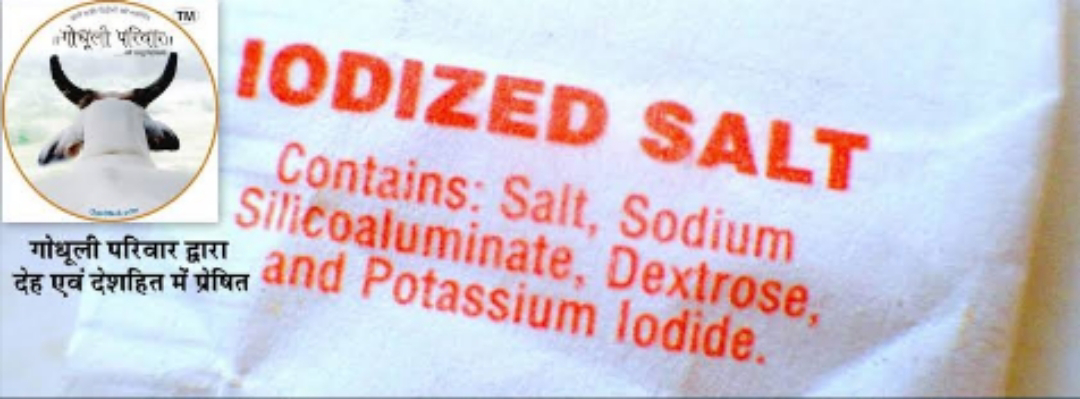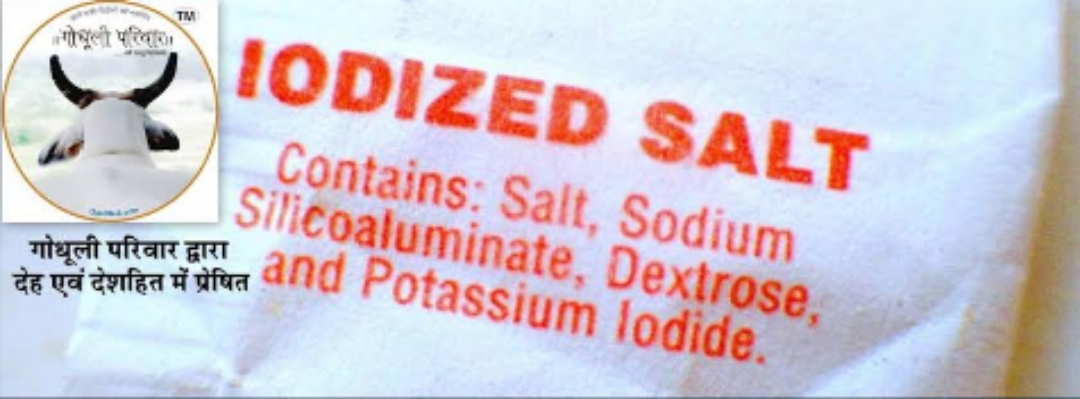Is Iodized Salt Beneficial or Harmful for Health? — A Scientific Perspective
क्या आयोडीन युक्त नमक खाना स्वास्थ्य के लिए लाभदायक है या हानिकारक? एक वैज्ञानिक दृष्टिकोण
( आप नीचे हिंदी में भी पढ़ सकते हैं )
( Apurba Das)
Salt is an essential component of our daily lives. Beyond enhancing the taste of food, it supplies the body with crucial minerals. To combat iodine deficiency disorders (IDD), the Government of India made iodized salt mandatory. However, recent studies suggest that excessive iodine intake might also pose health risks.
In this article, we will explore how beneficial iodized salt is for health, to what extent it is necessary, and what health concerns may arise from its overconsumption.
What is Iodine and Its Role in the Body?
Iodine is an essential trace mineral primarily used by the thyroid gland to produce hormones like thyroxine (T4) and triiodothyronine (T3). These hormones are crucial for:
Regulating metabolism
Supporting physical growth
Ensuring proper brain development
Diseases Caused by Iodine Deficiency
In developing countries like India, iodine deficiency was once widespread and led to various health problems, such as:
Goitre – Swelling in the neck due to an enlarged thyroid gland
Mental Retardation – Impaired brain development in children
Dwarfism – Stunted physical growth
Pregnancy Complications – Affecting fetal brain development
Fatigue and General Weakness
To counter these, the government launched a widespread campaign promoting iodized salt.
Recent Studies and Growing Concerns
Recent scientific studies have indicated that excessive iodine intake may negatively impact the thyroid gland, particularly in individuals already suffering from thyroid disorders.
Some key health conditions linked with iodine overconsumption include:
A) Hyperthyroidism
Condition: The thyroid gland becomes overactive and produces too much hormone.
Symptoms:
Rapid heartbeat
Weight loss
Anxiety and restlessness
Insomnia
Excess iodine can worsen this condition.
B) Hypothyroidism
Condition: The thyroid gland becomes underactive, producing insufficient hormones.
Symptoms:
Fatigue
Weight gain
Cold intolerance
Constipation and dry skin
In some cases, too much iodine can suppress thyroid function, leading to hypothyroidism.
C) Autoimmune Thyroid Diseases
Excessive iodine intake may trigger or worsen autoimmune conditions such as:
Hashimoto's Thyroiditis – The immune system attacks the thyroid gland
Studies suggest high iodine levels may provoke these autoimmune responses.
D) Skin Disorders
Some individuals may experience:
Acne
Itching
Red rashes
These are rare but documented side effects of excess iodine.
E) Effects on Pregnant Women and Children
Overconsumption of iodine during pregnancy can negatively impact the brain and heart development of the fetus.
So, Should We Stop Eating Iodized Salt?
No, iodized salt is not inherently harmful. It is essential, but balance is key.
WHO Recommendations :
• Adults: 150 micrograms of iodine per day
• Pregnant women: 250 micrograms per day
Iodized salt in India is formulated to meet these dietary needs. However, people should be
cautious in specific cases, such as:
• Individuals on thyroid medication
• Those with iodine sensitivity
• People diagnosed with autoimmune diseases
• Such individuals must monitor their iodine intake carefully and seek medical guidance.
Is Non-Iodized Salt a Safe Alternative?
Yes, low-iodine or non-iodized salt is available in the market. These can be suitable for people advised by doctors to avoid iodine. However, for the general population, avoiding iodized salt without medical supervision is not recommended.
How to Maintain a Healthy Balance?
1. Consult a doctor: If you have a thyroid condition, take advice before switching salt types.
2. Limit salt intake: According to WHO, salt consumption should not exceed 5 grams per day — iodized or not.
3. Get iodine from natural sources:
• Milk and dairy products
• Seafood
• Eggs
• Leafy green vegetables
Iodized salt has been an effective public health intervention in India to eliminate iodine deficiency disorders. However, new evidence suggests that too much iodine can be just as harmful as too little.
Hence, the key lies in balanced consumption and informed choices. If you suffer from thyroid or hormonal issues, it is crucial to consult your doctor before making changes to your diet.
Right knowledge and moderation are the cornerstones of a healthy life.
क्या आयोडीन युक्त नमक खाना स्वास्थ्य के लिए लाभदायक है या हानिकारक? एक वैज्ञानिक दृष्टिकोण
( Apurba Das )
हमारे दैनिक जीवन में नमक एक अनिवार्य हिस्सा है। भोजन का स्वाद बढ़ाने के अलावा, यह शरीर के लिए आवश्यक खनिजों की आपूर्ति भी करता है। भारत सरकार ने आयोडीन की कमी से होने वाली बीमारियों को रोकने के लिए आयोडीन युक्त नमक को अनिवार्य बनाया है। लेकिन हाल के कुछ अध्ययन यह संकेत दे रहे हैं कि आयोडीन की अधिकता शरीर के लिए हानिकारक भी हो सकती है।
इस लेख में आप जानेंगे कि आयोडीन नमक स्वास्थ्य के लिए कितना लाभदायक है, किस हद तक यह उपयोगी है, और किन बीमारियों का खतरा इससे जुड़ा है।
आयोडीन क्या है और इसकी भूमिका:
आयोडीन एक आवश्यक खनिज (mineral) है जो शरीर में मुख्य रूप से थायरॉयड ग्रंथि (thyroid gland) के माध्यम से कार्य करता है। यह थायरॉक्सिन (T4) और ट्राईआयोडोथायरोनिन (T3) जैसे हार्मोन के निर्माण में सहायक होता है। ये हार्मोन शरीर के मेटाबॉलिज्म, विकास, और मानसिक विकास के लिए जरूरी हैं।
आयोडीन की कमी से होने वाली बीमारियाँ:
भारत जैसे विकासशील देश में पहले आयोडीन की कमी के कारण निम्नलिखित समस्याएं आम थीं:
(1) ग्वायटर (Goitre): गर्दन में सूजन, थायरॉयड ग्रंथि का बढ़ना।
(2) मानसिक मंदता (Mental retardation): बच्चों में मानसिक विकास की रुकावट।
(3) बौनापन (Dwarfism): शारीरिक विकास में कमी।
(4) गर्भावस्था में जटिलताएं: गर्भ में बच्चे की मस्तिष्क विकास पर प्रभाव।
(5) शारीरिक कमजोरी और थकान
(6) इन समस्याओं को रोकने के लिए ही सरकार ने आयोडीन युक्त नमक का प्रचार किया, जिसे हम "आयोडाइज्ड नमक" कहते हैं।
हालिया अध्ययन और चिंताएं:
हाल के कुछ वैज्ञानिक अध्ययनों ने यह सुझाव दिया है कि:
(1) आयोडीन की अधिक मात्रा शरीर में लेने से थायरॉयड ग्रंथि पर प्रतिकूल प्रभाव पड़ सकता है।
(2) विशेष रूप से उन लोगों में जिन्हें पहले से थायरॉयड की समस्या है, उन्हें आयोडीन युक्त नमक हानि पहुँचा सकता है।
कुछ प्रमुख अध्ययन निम्नलिखित बीमारियों की ओर संकेत करते हैं:
(A) हाइपरथायरॉइडिज्म (Hyperthyroidism):
जब थायरॉयड ग्रंथि अधिक मात्रा में हार्मोन बनाने लगती है।
लक्षण:
(1) तेजी से दिल धड़कना
(2) वजन घटना
(3) बेचैनी और घबराहट
(4) नींद की कमी
अत्यधिक आयोडीन का सेवन इस स्थिति को और अधिक खराब कर सकता है।
(B) हाइपोथायरॉइडिज्म (Hypothyroidism):
थायरॉयड ग्रंथि की गतिविधि धीमी हो जाती है।
लक्षण:
(1) थकावट
(2) वजन बढ़ना
(3) ठंड सहन न होना
(4) कब्ज और त्वचा का सूखापन
(5) कुछ मामलों में आयोडीन की अधिकता से थायरॉयड ग्रंथि निष्क्रिय हो सकती है।
(C) ऑटोइम्यून थायरॉयड रोग (Autoimmune Thyroid
Disease):
(1) जैसे Hashimoto's Thyroiditis, जिसमें शरीर की प्रतिरक्षा प्रणाली खुद की थायरॉयड ग्रंथि पर हमला करती है।
(2) अध्ययन बताते हैं कि अधिक आयोडीन इस प्रक्रिया को प्रेरित कर सकता है।
(D) त्वचा विकार (Skin Issues):
कुछ लोगों में आयोडीन के अधिक सेवन से मुंहासे, खुजली, लाल चकत्ते जैसे लक्षण देखे गए हैं।
(E) गर्भवती महिलाओं और बच्चों पर प्रभाव:
अधिक आयोडीन का सेवन गर्भावस्था के दौरान बच्चे की मस्तिष्क और हृदय विकास पर प्रभाव डाल सकता है।
• तो क्या आयोडीन नमक न खाएं?
नहीं, ऐसा नहीं है। आयोडीन युक्त नमक पूरी तरह से हानिकारक नहीं है। यह आवश्यक है, लेकिन संतुलन जरूरी है।
• विश्व स्वास्थ्य संगठन (WHO) के अनुसार:
• एक व्यक्ति को प्रति दिन 150 माइक्रोग्राम आयोडीन की आवश्यकता होती है।
• गर्भवती महिलाओं को इसकी मात्रा थोड़ी अधिक (250 माइक्रोग्राम) चाहिए होती है।
• भारत सरकार द्वारा प्रदान किया गया आयोडीन युक्त नमक इस मात्रा के अनुसार डिज़ाइन किया गया है, लेकिन यदि:
(1) व्यक्ति पहले से थायरॉयड की दवा ले रहा हो
(2) उसे आयोडीन संवेदनशीलता हो
(3) या ऑटोइम्यून रोग हो
(4) तो उन्हें आयोडीन की मात्रा पर विशेष ध्यान देना चाहिए।
क्या आयोडीन रहित नमक एक विकल्प है?
कुछ बाजारों में "Low Iodine" या "Non-Iodized" नमक भी उपलब्ध हैं। ये उन लोगों के लिए विकल्प हो सकते हैं जिन्हें डॉक्टर ने विशेष रूप से आयोडीन से परहेज करने को कहा हो।
लेकिन आमजन के लिए, बिना डॉक्टर की सलाह के आयोडीन युक्त नमक को त्यागना उचित नहीं होगा।
कैसे रखें संतुलन?
डॉक्टरी सलाह: यदि थायरॉयड की कोई समस्या है तो डॉक्टर से पूछकर ही नमक का चयन करें।
नमक की मात्रा सीमित रखें: WHO के अनुसार, एक व्यक्ति को दिन भर में कुल 5 ग्राम से अधिक नमक नहीं लेना चाहिए — चाहे वह आयोडीन युक्त हो या न हो।
प्राकृतिक स्रोतों से भी आयोडीन लें:
• दूध और दूध से बने उत्पाद
• समुद्री मछलियाँ
• अंडे
• हरी सब्जियाँ
आयोडीन युक्त नमक भारत में आयोडीन की कमी से होने वाली बीमारियों को रोकने का एक प्रभावी उपाय रहा है। लेकिन अब यह समझना जरूरी है कि आयोडीन की अधिकता भी उतनी ही हानिकारक हो सकती है। इसलिए संतुलित मात्रा में आयोडीन का सेवन करें। यदि आप थायरॉयड या अन्य हार्मोनल समस्याओं से ग्रस्त हैं तो डॉक्टर से परामर्श लेना अति आवश्यक है।
सही जानकारी और संतुलन ही स्वस्थ जीवन की कुंजी है।














